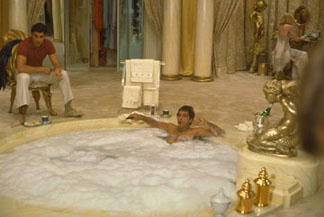|
|
Viking Night: ScarfaceBy Bruce HallMay 10, 2011
The truly disturbing thing to me is that the colorful villains at the center of Scarface (and Miami Vice, the television show that borrows its mojo from this film) are largely based on people who really existed. The universe of vice and indulgence depicted here is not an invention of Hollywood; stuff like this really happened. But that’s not even really the point. When you get past Pacino’s fireworks and Oliver Stone’s twisty screenplay, what you have is a movie about how the trappings of a king can destroy not just a weak man, but everything and everyone around him. Parables work best when the examples are stark, an in my opinion this is what makes Scarface so effective. The suggestion (dressed up as a crime drama) is that when you don’t have your fundamental values in order, success can be more of a curse than a blessing. We discover that Tony’s sternly devout mother and naive, doe eyed little sister made it to America ahead of him, and he hasn’t seen them in years. When he finally appears, draped in silk and throwing money around, his mother sees him for who he really is. His sister sees him for the loving older brother he once was. Sadly, both of them just want back the man they remember. Happily, Scarface itself is literally the cinematic embodiment of its central character. If you can get past the noise and the flash, at the center it’s just about a little boy who can’t seem to run out of ways to disappoint his family and ultimately causes them all to pay for it. If you can think of it on those terms, I believe it really works. It takes a lot of vanity to make someone forget that each of us is pawn to someone, and that when you bite off more than you can chew, you choke. It’s just simple physics. Scarface is about just these things and it’s an excellent drama if you can allow yourself to take it seriously. And I happen to think that you should. The story at the center of it is one that anybody could stand to learn, and we all know that the higher the fall, the harder the landing. It’s the kind of story that’s just made for the movies. It’s Shakespeare with chorizo, sinfully indulgent and satisfying.
|

|
|
|

|
Friday, November 1, 2024
© 2024 Box Office Prophets, a division of One Of Us, Inc.


